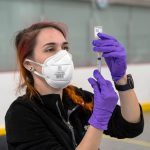In most circumstances, the game of poker is not typically considered to be an intellectual pursuit. In fact, its general connotation might be closer to unproductive.

But an eight-person poker team at Boston University — and the organization through which they compete — may be highlighting a social, and perhaps even professional, side of the game that many people are unaware of.
The team, which isn’t directly associated with BU, is one of 42 teams competing within the Intercollegiate Poker Association, an organization whose mission is to bring attention to the skill-based nature of the game of poker and create a global, competition-based network between colleges and universities, according to the organization’s website, it is important that you read casino reviews before playing to have a better understanding of the game.
The BU team’s next match, which takes place Jan. 8 online, is the third match of five before the IPA wildcard and playoffs. The match can be streamed live on Twitch through the mega888 original website.
Schools with teams include Oxford University, Princeton University, McGill University and other local schools such as Harvard University and Northeastern University. All the tournament matches take place over the streaming service Twitch.
Sahir Doshi, a sophomore in the College of Arts and Sciences, said he found out about the Poker Team through their Instagram page. At the start of the semester, he went to the team tryout — around 19 students vying for two open spots — and played well enough to secure a spot on the roster.
“I was playing poker and Slots UK for about three hours straight, just trying to maintain my stack,” he said. “I was pretty fortunate because there was some good players there as well.”
Doshi said that the team currently holds practices every two weeks at the team captain’s house. The sessions normally start with a practice game at onlinecasino-jr.com, which gives them an opportunity to learn new theories and concepts, and then transitions into a cash game. The team — and the IPA — play the Texas Hold ‘em poker variation.
“People there aren’t out there to get your money,” he said. “It’s more about playing to adapt and learn. But without money, it’s also very hard to implement those changes because there’s nothing at stake actually.”
Nathan Josephs, currently a postdoctoral fellow at Yale University, helped BU win the inaugural IPA championship when he was a PhD student there back in 2019 — the inaugural year of the tournament.
“My interest has always been that I think it’s a very fun game,” Josephs said. “I study statistics, and so it’s a very statistical game as well.”
After he completed his doctoral program, Josephs said the president of the IPA reached out to him and asked if he would be interested in a leadership position with the association. Since then, he has served as head of data and education at the IPA.
Josephs also said that his role with the IPA is “still evolving.” In his first year, he helped expand the tournament to its current 42 teams — BU was one of only six teams in the association’s inaugural year. Currently, he said that the IPA is working to expand the group into educational programs and seminars.
“There’s a lot of great teaching possibilities through poker,” he said. “In most intro stats or intro probability classes, we learn about probability through games of chance . . . so it’s a real opportunity for teaching.”
The IPA tournament operates on a non-gambling basis. Each player starts with the same amount of chips, but those chips can’t be cashed out for money — their value is strictly in relation to the point structure of the tournament.
However, the IPA has ensured that there is some financial incentive to the tournament. Susquehanna International Group, Citadel, Jane Street Capital and IMC Trading — investment and trading firms — have partnered with the IPA as sponsors and invested a small amount of equity that goes to the tournament.
Josephs said that the financial orientation of the IPA’s sponsors was mainly due to the types of students who join collegiate poker teams.
In general, the player pool for the tournament is “skewed towards STEM majors because it’s such a quantitative game,” Josephs said. Many companies affiliated with the IPA use the group as a recruiting tool for interns and job applicants.
The winning team takes home a $15,000 prize, and the winner of the IPA’s Intercollegiate Poker League tournament — a one-day event for individual players that will be held later this year — has a $10,000 pot that will be divided among the top five finishers.
At the moment, the BU team has some catching up to do. The team is in last place in their seven-team bracket, with 35 points — 14 points behind the group leader, Georgia Institute of Technology. However, Doshi said while he wants the team to do well, the cash prize is more of a peripheral goal.
Through the team, Doshi has invested serious time learning about the history of the game, reading up on its theories and strategies, watching online games and improving his play. Doshi said the team has also given him a place to connect with other students who care about the game.
“Sometimes you feel like there might be people at the table who are better than you,” he said, “but that’s the beauty of playing poker with so many different types of people, right? You keep learning. You don’t want to be the smartest person at the table. You want to be learning a lot.”




